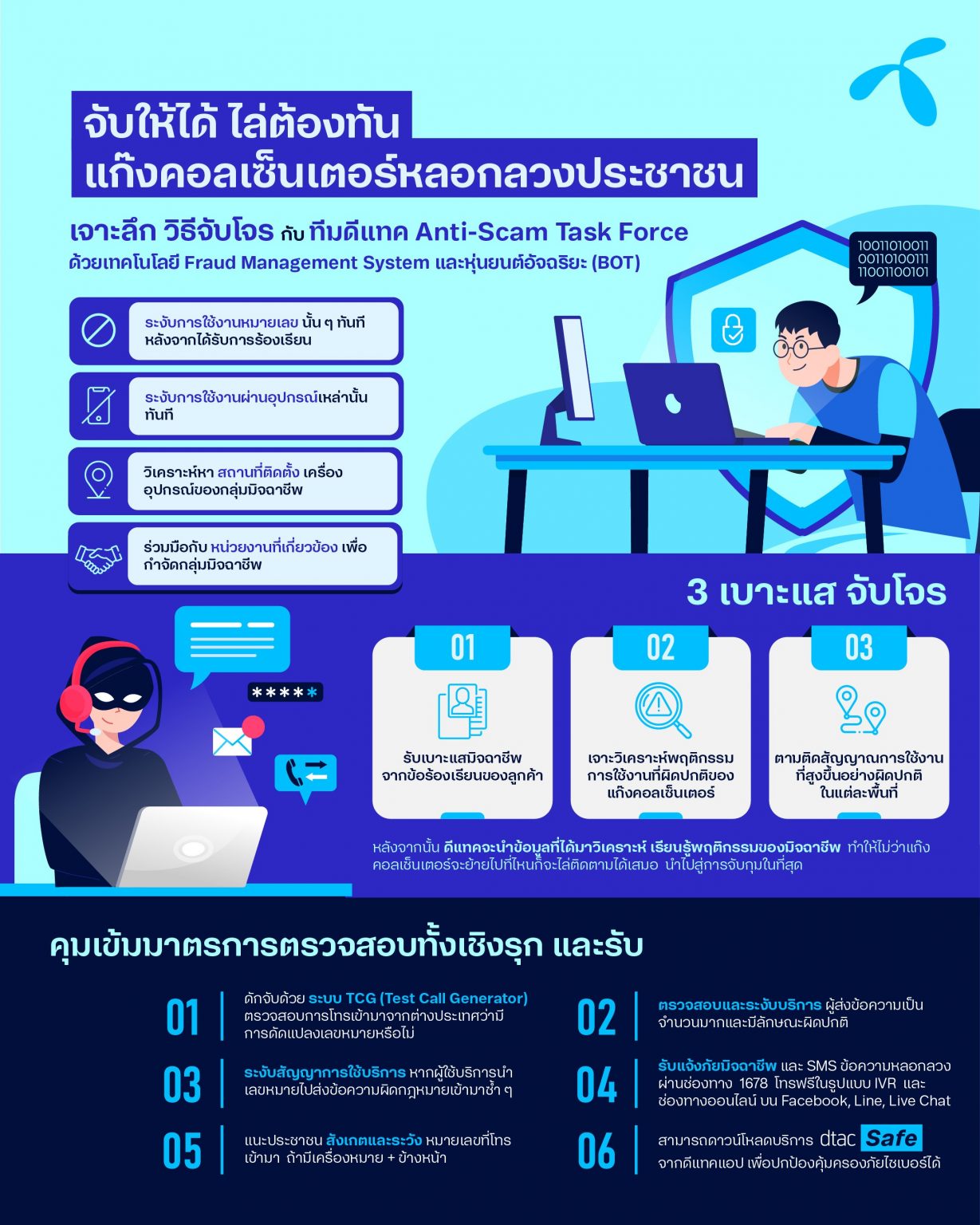20 September 2022 – Amidst the increasing call center and SMS scams, consumers are avoiding taking calls from unfamiliar numbers. However, have you ever wondered why we still receive SMS and calls from scammers non-stop, even though mobile operators, police and NBTC are taking serious actions with them?
The dtac Anti-Scam Task Force reveals its strategy includes a Fraud Management system and the use of RPA (Robotic Automation Process) technology to track and identify call center scammers, leading to apprehension by law enforcement.
Deep Dive in How We Catch Scammers
dtac Anti-Scam Task Force compiles and analyzes multiple sets of data including complaints from our customers, data on call volumes, and network congestion which is then correlated to identify phones used for scamming. The task force is regularly reviewing its criteria to identify any missing links and improve its identification and suspension processes.
When a phone used by a scammer is identified, all other numbers using the device are also suspended to minimize future threats. The task force is identifying proactive systems / controls to minimize the spam to its customers and involves a continuous process of improvement.
Next, the details that have helped to suspend numbers can then be used to pinpoint the location of call center scammers. Initially, dtac found that after such analysis many scammers operate close to the border. Scammers then developed more sophisticated call scamming tactics which are very easily available in the marketplace. This is their attempt to hide their digital trails, such as alternating calls using domestic and overseas numbers, or alternating calls and texting.
The dtac task force is also reviewing practices of its retailers who sell SIMs to spammers in order to take corrective or legal action as necessary while also reviewing the packages and plans used for spam.
There are numerous challenges to identifying spammers/ scammers. For instance, the behavior patterns of spammers can be hidden with the help of modern equipment that can spoof their location, equipment details such brand, make, model, and their identity. When addressing the constantly evolving scam environment, the dtac task force treats customer privacy as a primary concern by ensuring its techniques will be non-intrusive to customer privacy while also protecting its customers from possible spam.
The dtac task force involves other major stakeholders in preventing scams, such as by reporting the identities of the devices used in scamming to the NBTC and Thai Customs Department, which will in turn be blacklisted from import into Thailand.
3 Clues to Arrest Scammers
- The most important information about call center or SMS scammer is complaints reported by customers.
- Abnormal phone usage, such as mass texting to multiple numbers in a short period, or random but repetitive calls to a certain number. Tools such as SIMBOX, GSM modem or IP-PBX appliances are also susceptible to fraudulent use.
- Abnormal usage and traffic in some locations may point to scammers who are deploying various communication devices to “camouflage” the actual numbers used in scamming.
Strict Proactive and Reactive Measures
- We use Test Call Generator (TCG) to probe inbound calls from overseas in case of phone number modifications for illegal purposes through services not licensed by the NBTC.
- We probe when mass and suspicious texting is detected, identifying the source and blocking the number.
- When a user creates mass texting that is in breach of their service contract, we will terminate the contract.
- dtac’s #1678 free hotline is dedicated to receiving complaints on scamming calls and SMS. Other channels subscribers can contact us are our official Facebook, Line and Live Chat accounts.
- We recommend customers download and install dtac Safe, a cybersecurity service from the dtac app.
- Users should be wary of any incoming calls starting with the “+” sign, as it is an overseas call, and not to answer if it is an unfamiliar number.
- dtac requests its customers to be vigilant in protecting themselves from such frauds and support dtac in its efforts to protect them from possible fraud by reporting calls or SMSs from scammers to our 1678 call center, where the report will be handled immediately through a prompt investigation, with possible blocking and referral to law enforcement for further legal action.


